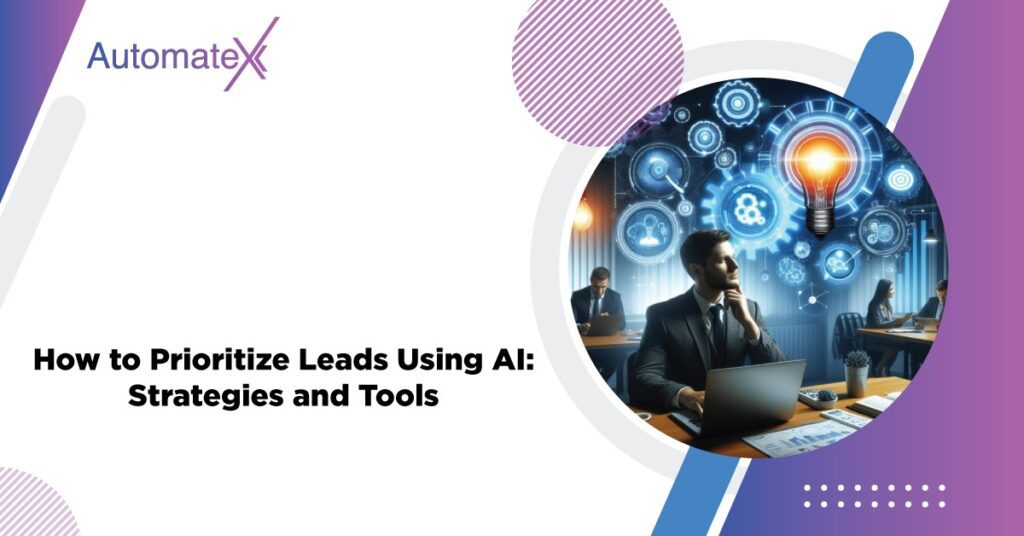In the realm of modern business operations, lead generation is not merely about accumulating contacts; it’s about identifying and nurturing high-potential leads that are more likely to convert into loyal customers. With the advent of artificial intelligence (AI), businesses can now leverage advanced algorithms and predictive analytics to streamline the lead prioritization process. At Automatex, we specialize in implementing AI solutions that help businesses effectively prioritize leads, optimize sales efforts, and boost overall efficiency.
Introduction to Lead Prioritization with AI
Lead prioritization refers to the process of evaluating and ranking leads based on their likelihood to convert into customers. AI plays a pivotal role in this process by analyzing various data points and patterns to identify leads that are most aligned with a company’s ideal customer profile (ICP). By focusing resources on high-quality leads, businesses can maximize their sales productivity and achieve better ROI.
Benefits of Using AI for Lead Prioritization
AI-powered lead prioritization offers several key benefits:
– Increased Efficiency: AI algorithms automate the lead scoring process, enabling sales teams to prioritize leads quickly and accurately.
– Improved Conversion Rates: By focusing on leads with the highest conversion potential, businesses can enhance their sales outcomes.
– Enhanced Personalization: AI analyzes customer data to tailor interactions and offerings based on individual preferences, boosting engagement.
– Optimized Resource Allocation: Allocate sales and marketing resources more effectively by focusing efforts on leads most likely to convert.
Strategies for Effective Lead Prioritization
- Define Lead Scoring Criteria: Establish clear criteria for lead scoring based on demographic information, behavior patterns, engagement metrics, and firmographic data.
- Implement Predictive Lead Scoring Models: Utilize AI-driven predictive analytics to forecast lead behavior and prioritize leads accordingly. These models analyze historical data to predict future outcomes.
- Real-time Lead Scoring Updates: Enable real-time updates to lead scores based on new interactions or data points, ensuring the most current insights guide decision-making.
- Integration with CRM Systems: Integrate AI-powered lead scoring with Customer Relationship Management (CRM) systems to streamline data management and ensure seamless communication between sales and marketing teams.
Tools and Technologies for AI-Powered Lead Prioritization
Several AI tools and technologies are instrumental in lead prioritization:
– Machine Learning Algorithms:Algorithms like logistic regression, decision trees, and neural networks analyze data to predict lead behavior and prioritize accordingly.
– Natural Language Processing (NLP):NLP helps analyze and understand customer communications, extracting valuable insights to inform lead prioritization strategies.
– Predictive Analytics Platforms:Platforms that offer predictive modeling capabilities provide actionable insights into lead behavior and conversion likelihood.
Case Studies: Successful Implementation of AI in Lead Prioritization
Real-world examples illustrate the effectiveness of AI in lead prioritization across various industries, highlighting significant improvements in conversion rates and sales efficiency.
Future Outlook: Innovations in AI for Lead Prioritization
As AI technologies continue to evolve, future innovations will focus on enhancing predictive accuracy, integrating AI with emerging technologies like IoT and blockchain, and further personalizing customer interactions.
Link to main pillar content: For more insights into advanced strategies for AI-powered lead generation in 2024, visit Advanced Strategies for AI-Powered Lead Generation in 2024.
FAQs about AI-Powered Lead Prioritization
-
How does AI determine which leads to prioritize?
AI determines lead prioritization based on factors such as historical data, behavioral analysis, engagement levels, and demographic information. Algorithms assign scores to leads, indicating their likelihood to convert.
-
What are the common challenges in implementing AI for lead prioritization?
Challenges include data quality issues, ensuring accurate predictive models, integrating AI with existing systems, and aligning AI-driven insights with sales and marketing strategies.
-
Why is real-time lead scoring important?
Real-time lead scoring allows businesses to respond promptly to lead interactions, adjusting strategies based on the most current data to maximize conversion opportunities.
-
How can businesses measure the effectiveness of AI-powered lead prioritization?
Key metrics include conversion rates from prioritized leads, sales cycle length, ROI on marketing spend, and overall revenue growth attributed to AI-driven strategies.
-
What role does AI play in enhancing personalization in lead prioritization?
AI analyzes individual customer preferences and behaviors, enabling businesses to tailor interactions and offerings in real time, fostering deeper customer relationships, and improving conversion rates.

